Rehousing Early Release Prisoners in Budget Hotels: A Cost-Effective Solution
The government’s initiative to rehouse newly freed prisoners in budget hotels as part of early release programs has raised concerns and sparked discussions about the effectiveness and implications of such a strategy. With the goal of easing pressure on the justice system, the government has implemented a policy to release offenders after serving 40% of their sentence rather than the current 50%, resulting in approximately 1,700 individuals expected to be let out.
Justice Secretary Shabana Mahmood addressed questions about this approach during a session in the House of Commons. In response to queries from Labour MP Andrew Ranger regarding housing arrangements for released prisoners, Ms. Mahmood stated that collaboration with the Ministry of Housing, Communities, and Local Government is essential to understand the impact on the housing sector. She emphasized the importance of probation staff working diligently to create release plans that include both permanent and temporary accommodation options for offenders.
In cases where released prisoners face homelessness, community accommodation will be provided, with a focus on utilizing existing resources. However, in instances where suitable housing is not available, probation directors have been authorized to arrange alternative accommodations, including budget hotels, as a temporary measure. The intention is to ensure that individuals transitioning out of prison have a safe and stable living environment to reduce the risk of reoffending.
The Ministry of Justice (MoJ) has clarified that the use of budget hotels for housing released prisoners is distinct from the Home Office’s practice of accommodating migrants in hotels, which incurs significant costs for taxpayers. The MoJ’s policy is intended as a last resort when local authorities are unable to secure housing options for released prisoners, and it may not be necessary if other arrangements are made. Importantly, the policy does not apply to individuals convicted of violent, sexual, terrorism, or domestic abuse offenses, ensuring that only low-risk individuals are considered for this housing solution.
The release of 1,700 prisoners under this program will supplement the regular flow of approximately 1,000 individuals leaving prisons in England and Wales each week. The government’s decision to implement early release measures is part of broader efforts to address the challenges facing the justice system and prevent potential risks to public safety. By providing housing for offenders upon release, the government aims to reduce the likelihood of reoffending and promote successful reintegration into society.
Subheadings:
1. Government Initiative to Ease Pressure on Justice System
2. Housing Solutions for Released Prisoners
3. Differentiating the Use of Budget Hotels for Rehousing
The Ministry of Justice has emphasized the importance of ensuring that offenders have stable housing upon leaving prison to minimize the risk of recidivism and enhance rehabilitation opportunities. By prioritizing the basic needs of individuals transitioning out of the criminal justice system, the government aims to support successful reentry into society and reduce the burden on prisons and law enforcement agencies.
As the government navigates the complexities of early release programs and housing arrangements for released prisoners, ongoing collaboration between various departments and agencies will be crucial to address the diverse needs of individuals reentering society. By exploring innovative solutions and leveraging existing resources, the government can strive to create a more effective and sustainable approach to supporting individuals in their transition from incarceration to community living.












